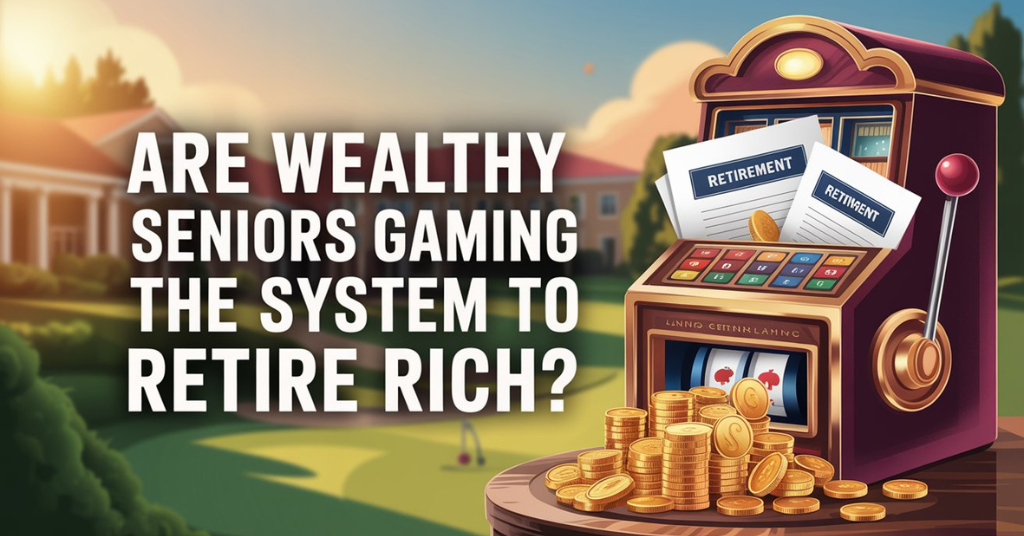Retirement accounts like IRAs and 401(k)s were created to help middle-class Americans save for their future. The idea was simple: give workers a tax break today so they can have financial security tomorrow. But over the past few decades, wealthy seniors have found ways to leverage loopholes, complex tax codes, and clever strategies to turn these accounts into multi-million-dollar—and sometimes even billion-dollar—tax shelters.
This raises an important question: Are wealthy seniors gaming the system to retire rich?
In this blog, we’ll break down how these strategies work, share real-life examples, do some calculations, and explore the fairness and ethics behind them.
The Original Purpose of Retirement Accounts
When IRAs (Individual Retirement Accounts) and Roth IRAs were introduced, they had clear goals:
- Traditional IRA: Contributions are tax-deductible, but withdrawals in retirement are taxed.
- Roth IRA: Contributions are made after taxes, but withdrawals in retirement are tax-free.
The limits were set to keep them accessible for the middle class. For example:
- In 2024, the maximum IRA contribution is $7,000 (or $8,000 if over age 50).
- Income limits apply for Roth contributions to prevent high earners from overusing them.
These rules were supposed to stop the rich from stockpiling tax-free wealth. But reality turned out differently.
The Rise of Mega-IRAs
Despite contribution limits, some retirement accounts today are worth millions—even billions.
Shocking Numbers
- Over 28,000 Americans have IRA accounts valued at $5 million or more.
- Around 500 individuals hold IRAs above $25 million, with an average balance of $150 million.
- Tech investor Peter Thiel turned his Roth IRA into a $5 billion tax-free empire by buying early shares of PayPal at pennies.
This wasn’t what lawmakers intended when they created IRAs.
How Do Wealthy Seniors Build Mega-IRAs?
Wealthy retirees aren’t breaking the law. Instead, they use creative strategies that bend the intent of the system.
A. Pre-IPO Shares in Roth IRAs
- Wealthy founders buy startup shares at very low prices inside a Roth IRA.
- When those shares skyrocket after going public, all the gains are 100% tax-free.
Example Calculation
- Initial purchase: 1 million startup shares at $0.01 each = $10,000 inside a Roth IRA.
- If share price grows to $50: value = $50 million, all tax-free.
That’s how billionaires like Peter Thiel built their mega accounts.
B. Backdoor Roth Conversions
High earners are normally blocked from contributing to Roth IRAs. But since 2010, they’ve used a loophole:
- Contribute to a traditional IRA (no income limit).
- Convert it into a Roth IRA (paying minimal taxes upfront).
This is called the backdoor Roth. It’s completely legal—and extremely popular among wealthy seniors.
C. Cash-Balance Pension Plans
Business owners often create cash-balance pension plans that allow much larger contributions than normal IRAs. These plans can shelter hundreds of thousands of dollars annually from taxes, benefiting the rich far more than average workers.
D. The “Wealth Defense Industry”
Wealthy seniors often hire lawyers, accountants, and financial advisors who specialize in tax loopholes. This so-called “wealth defense industry” designs strategies that maximize tax breaks and minimize obligations—perfectly legally.
A Side-by-Side Calculation: Are Wealthy Seniors Gaming the System to Retire Rich
Let’s compare a middle-class saver with a wealthy investor using retirement accounts.
Case 1: Average Saver
- Contributes $6,000 per year from age 30 to 65.
- Assumes 7% annual growth.
- Final balance at retirement: $754,000.
Case 2: Wealthy Investor (Startup Shares in Roth)
- Invests $2,000 worth of startup shares at $0.01 each.
- Company value rises, and shares become worth $200 million.
- Since it’s in a Roth IRA, withdrawals are tax-free.
👉 Same system, same laws—but drastically different results.
Social Security: The “Icing on the Cake”
Another area where wealthy seniors may appear to be gaming the system is Social Security.
- A billionaire qualifies for Social Security payments just like an average worker, despite not needing the money.
- Critics argue Social Security should function like insurance, where wealthy seniors with millions in assets should be excluded.
- Others say if they paid into the system, they deserve benefits regardless of wealth.
This debate highlights the fairness issue at the core of retirement policy.
Why Does This Matter?
A. Growing Inequality
The average American retires with less than $100,000 in savings. Meanwhile, wealthy seniors sit on multi-million-dollar IRAs. This widens the retirement wealth gap.
B. Lost Tax Revenue
The government loses over $195 billion each year in tax revenue because of retirement tax preferences that primarily benefit the wealthy. That’s money that could fund healthcare, education, or infrastructure.
C. Public Trust Issues
When regular people see billionaires shielding billions tax-free while struggling with their own retirement, it erodes trust in the system.
Reform Efforts
Lawmakers have noticed the problem, but fixes are slow.
- The RISE Act (2016) tried to limit Roth conversions and cap mega-accounts. It failed.
- In 2021, Congress proposed forcing distributions from Roth IRAs above $5 million, but it didn’t pass.
- President Biden’s Build Back Better plan included restrictions, but they were later dropped.
So far, wealthy seniors still have the green light to use these strategies.
Are Middle-Class Retirees Also Gaming the System?
It’s not just billionaires. Middle-class retirees sometimes structure their income to qualify for ACA subsidies or reduce Medicare premiums.
Example:
- A couple with $80,000 in assets might carefully withdraw only $30,000 a year to keep income low and qualify for health subsidies.
This shows that everyone tries to optimize within the rules. The difference is scale: the wealthy shelter billions, while others save a few thousand.
Ethical Debate: Fair or Unfair?
- Supporters’ View: If it’s legal, it’s fair. Everyone has the same opportunities.
- Critics’ View: The retirement system was meant to help average families, not give billionaires tax-free empires.
Ultimately, it comes down to intent vs. loopholes. The law’s intent was fairness, but loopholes shifted benefits toward the wealthy.
What Could Be Done?
To make retirement fairer, experts suggest:
- Cap Roth IRAs at $5 million.
- Ban illiquid pre-IPO assets inside retirement accounts.
- Require wealthy retirees to take distributions above certain thresholds.
- Reform Social Security to exclude ultra-wealthy retirees.
Conclusion
So, are wealthy seniors gaming the system to retire rich? The answer is yes—but legally. They use Roth conversions, pre-IPO shares, and cash-balance plans to build tax-free fortunes far beyond what lawmakers intended.
For everyday Americans, this highlights an important lesson: learn the rules and use them wisely. While you may not build a $5 billion IRA, strategies like consistent contributions, Roth conversions, and tax planning can still secure a comfortable retirement.
At the same time, policymakers must ask: Should retirement savings programs serve everyone equally, or mainly the wealthy? Until reforms happen, wealthy seniors will continue to retire richer than ever—legally gaming the system all the way.










